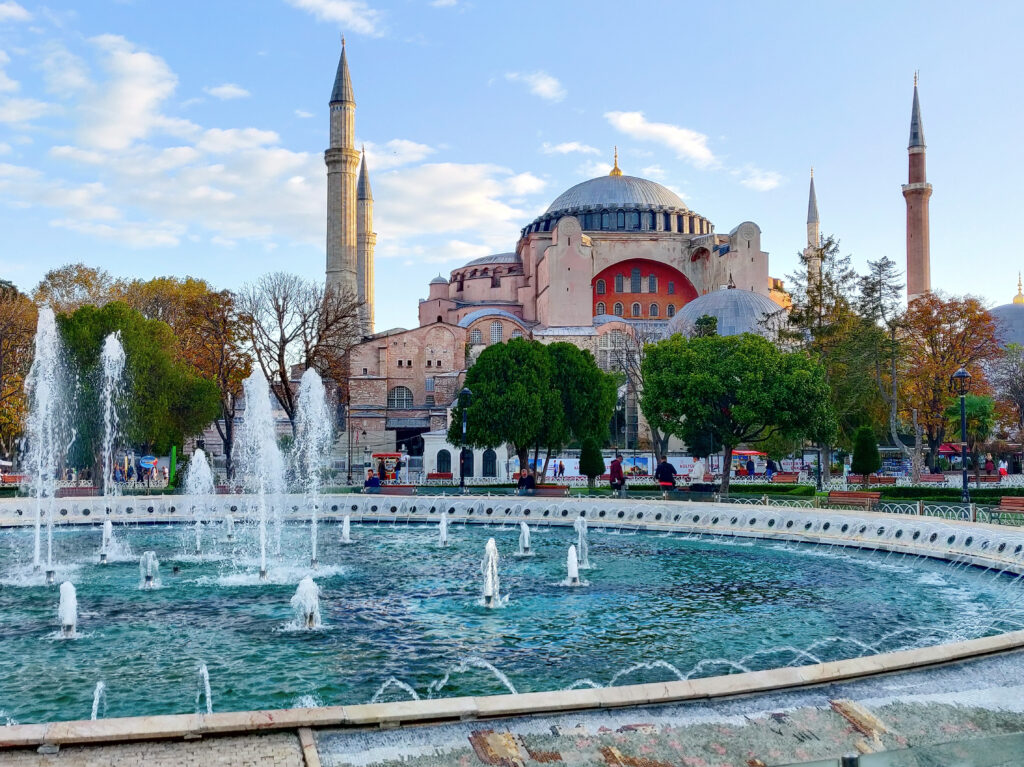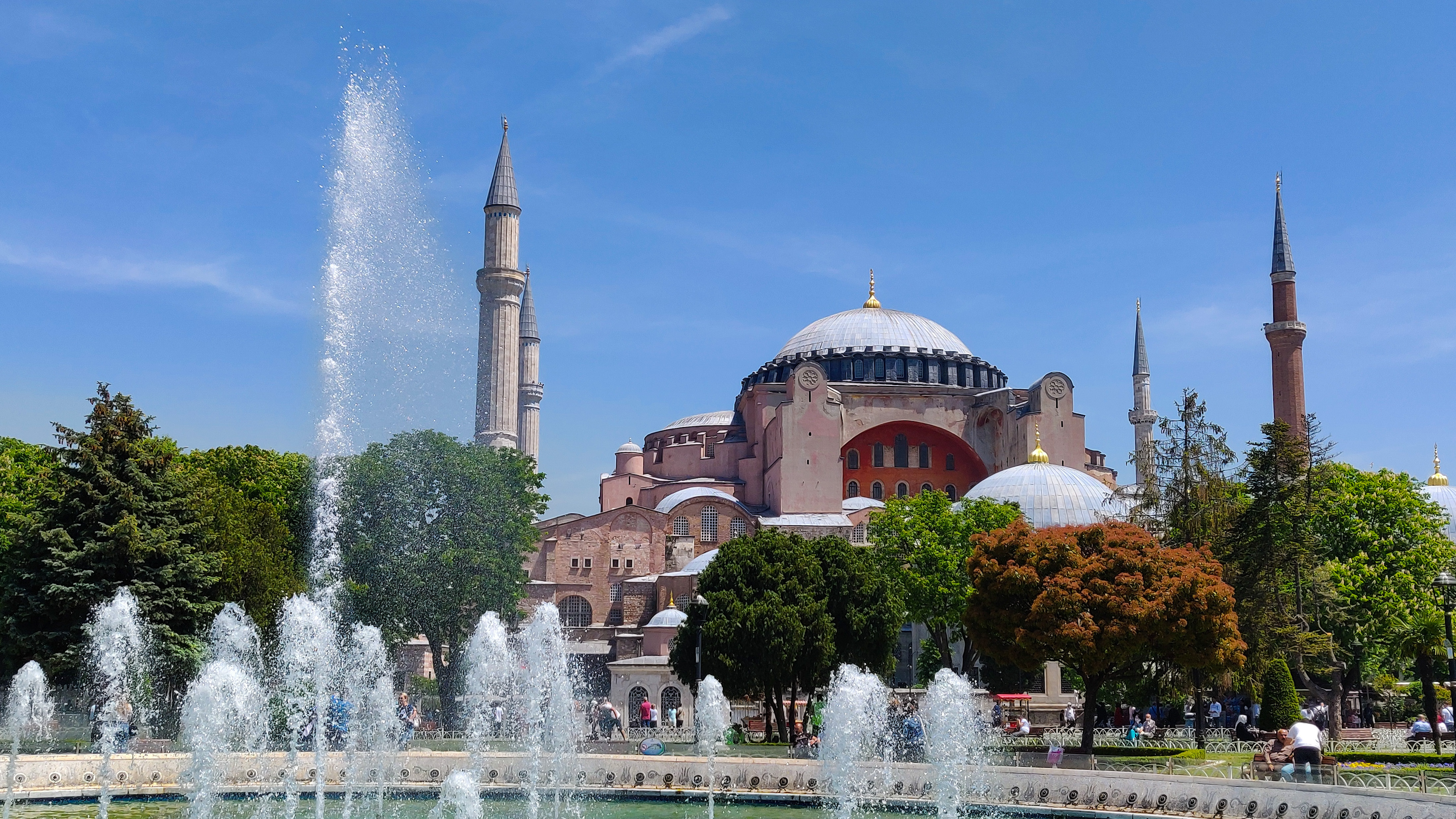In the midst of world history
As you step into the vicinity of Hagia Sophia, you find yourself in the middle of world history. Rarely will you find so many historical sites within a few minutes’ walk of each other.
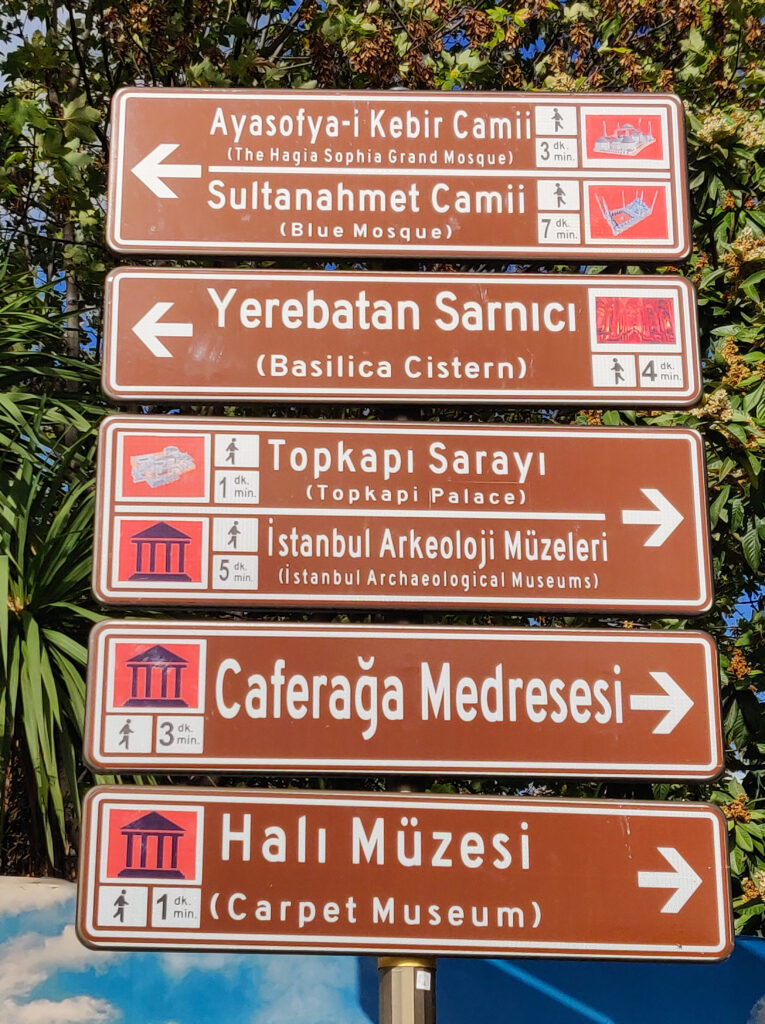
Hagia Sophia (officially the Hagia Sophia Grand Mosque, in Turkish Ayasofya-i Kebir Cami-i Şerifi) is located on the European side in the Fatih district on Istanbul’s first hill. More precisely, it is situated on a peninsula in the historic Sultanahmet area, surrounded by the Sea of Marmara, the Bosphorus, and the Golden Horn on three sides.
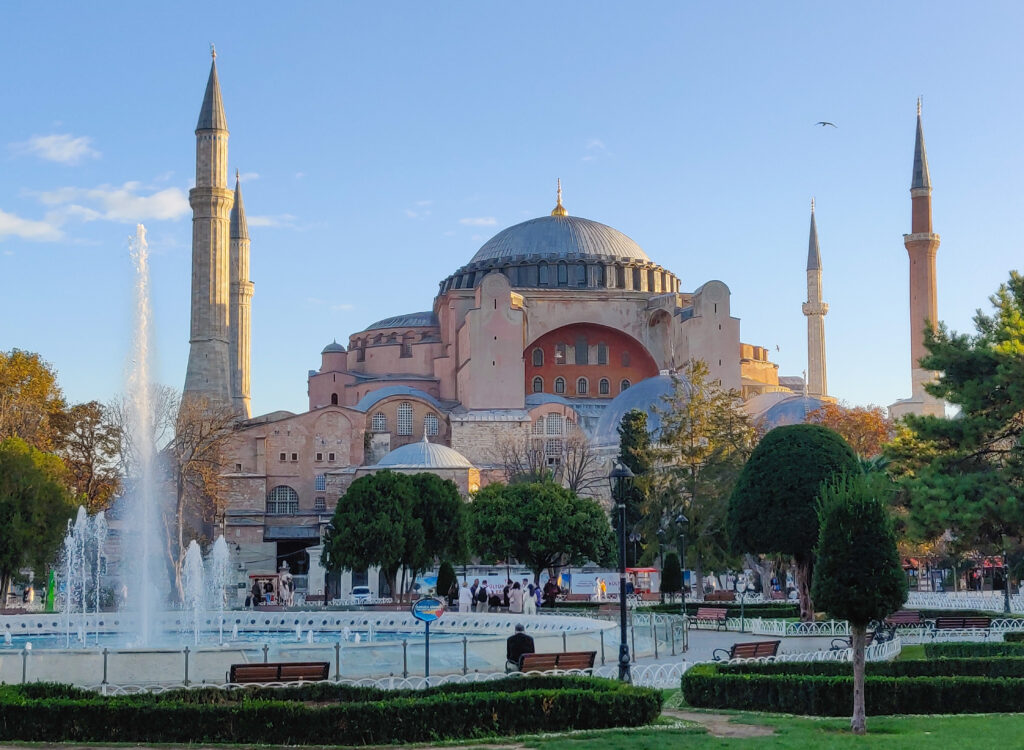
Hagia Sophia stands majestically as a masterpiece on the edge of Sultan Ahmet Park (Sultan Ahmet Parkı), facing another historically significant building across the park, the Sultan Ahmed Mosque (Sultanahmet Camii), also known as the Blue Mosque. Thus, this park with its fountains forms a beautiful and historically breathtaking square.
In the spring, the park is covered with colorful tulips. During the Tulip Festivals (İstanbul Lale Festivali), you can see an incredibly beautiful, enormous tulip carpet in Sultanahmet Square (Sultanahmet Meydanı).
Three Hagia Sophias
The innovative architecture, rich history, significant religious importance, and exceptional features of Hagia Sophia have endured the test of time for centuries. The Hagia Sophia we know today has been built three times on the same site, thus the current version is known as the “third Hagia Sophia”.
The first Hagia Sophia was built by Roman Emperor Constantius II (reigned 337-361) in 360 and was then called Megale Ekklesia (Great Church). However, after the fifth century, it was already referred to as Hagia Sophia (Holy Wisdom), and it was the largest cathedral in the city throughout the Byzantine era. The first church had a wooden roof and was expanded vertically (basilica), but it was burned down during a public riot in 404.
Eastern Roman Emperor Theodosius II (reigned 408-450) built the second Hagia Sophia on the ruins of the first in 415. This basilica, which also had a wooden roof, was destroyed on 15th January 532, during the so-called Nika riot in the fifth year of Emperor Justinian I’s reign.
After the riot, Eastern Roman Emperor Justinian I (reigned 527-565) decided to rebuild Hagia Sophia much larger and more splendid than its predecessors. Construction began in 532, led by Anthemios (a mathematician) and Isidore (a geometer and engineer). Thus, the third and current Hagia Sophia was completed in five years and opened on 27th December 537.
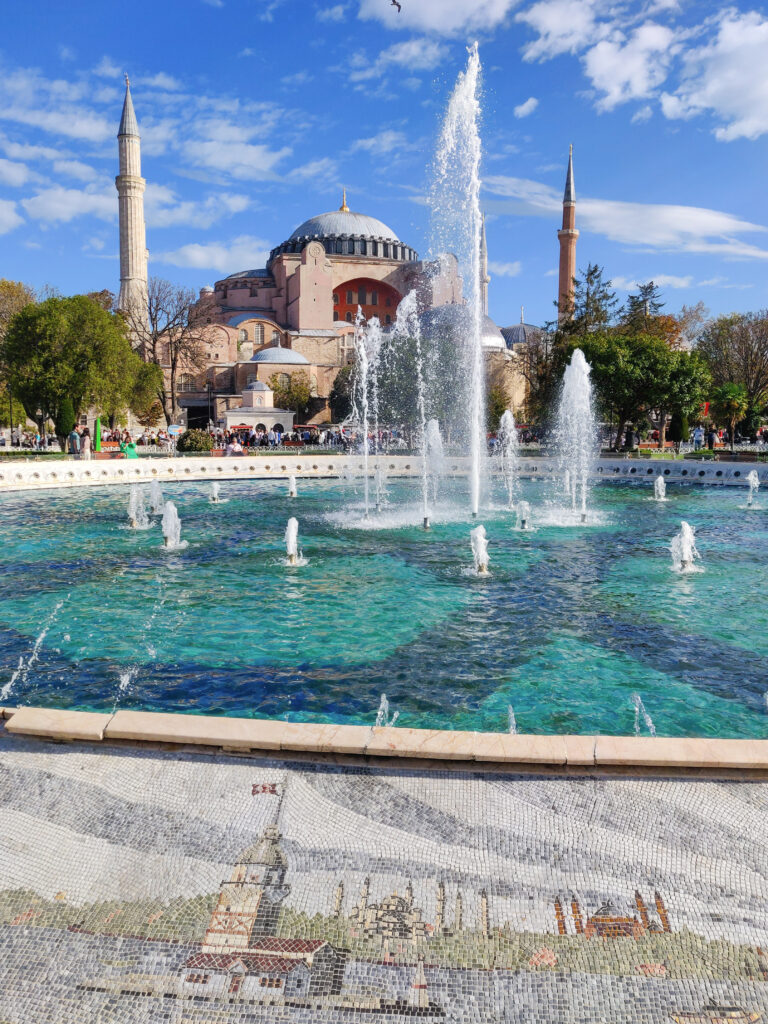
Throughout its history, this third version of Hagia Sophia faced destruction from riots, wars, and natural disasters until the conquest of Istanbul (1453), when the forces of Sultan Mehmet II (Fatih Sultan Mehmed), i.e., the Ottoman Empire, conquered the then capital of the Byzantine Empire, Constantinople.
The Ottomans considered Hagia Sophia a symbol of their conquest and invested in its maintenance and repairs. From the time of Mehmed II, or Mehmed the Conqueror, every sultan sought to enhance the mosque’s beauty. Architect Mimar Sinan’s additions and arrangements significantly contributed to preserving this important heritage of world history.
Mustafa Kemal Atatürk, the founder and first president of the Republic of Turkey, decided to turn Hagia Sophia into a museum in 1934, and it served as a museum until 2020. In July 2020, President Erdoğan chose to convert Hagia Sophia back into a mosque. This decision to transform the building into a mosque meant, among other things, covering the medieval Christian mosaics. A turquoise wall-to-wall carpet was also laid in the mosque’s large prayer hall at that time.
A tour inside the Hagia Sophia Grand Mosque
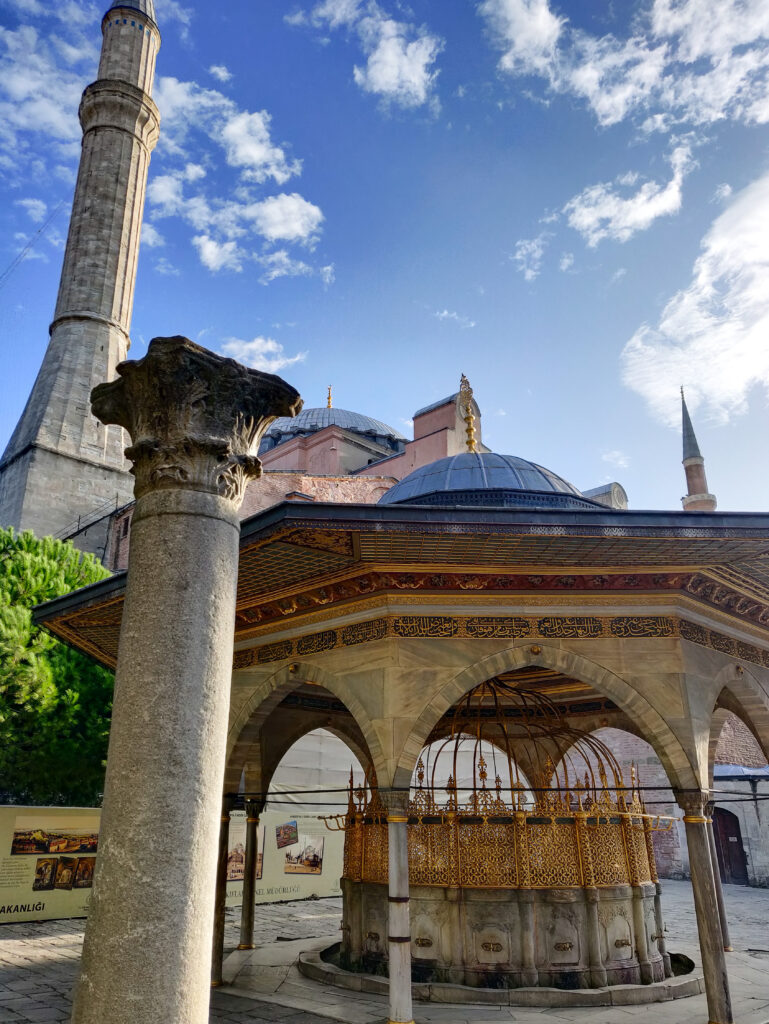
First, in the courtyard, you are greeted by a beautiful and mystical fountain known as the “Wishing Well”. This fountain has a fascinating history dating back to the Byzantine era. According to legend, the water from the fountain has special healing powers.
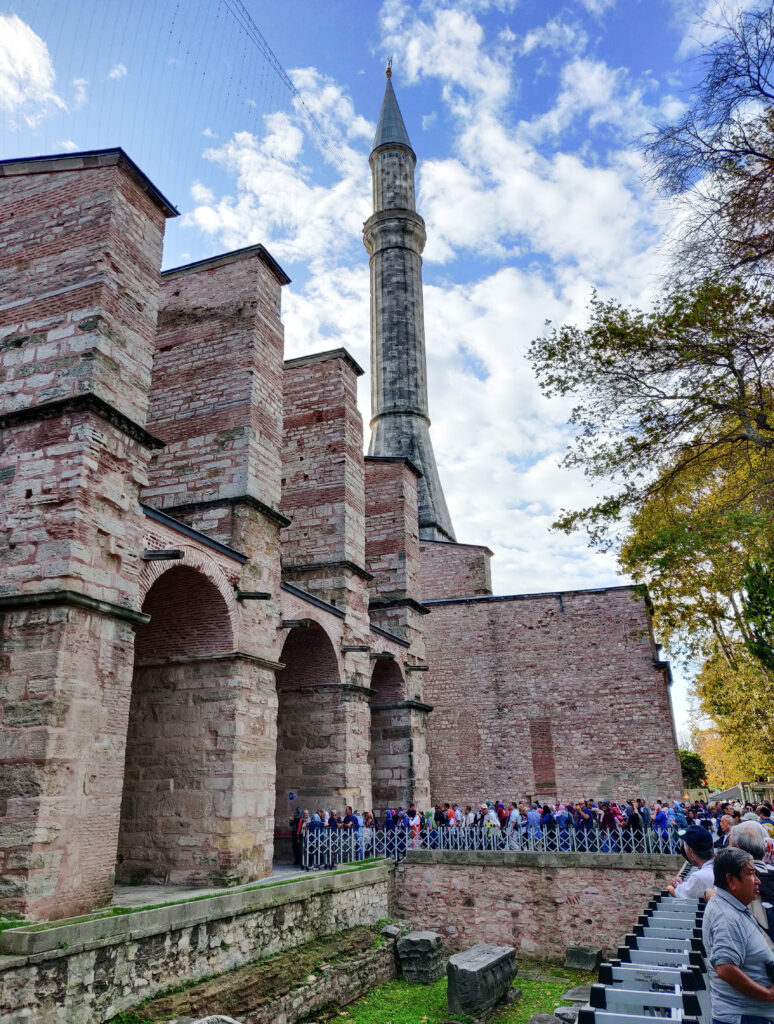
The entrance to this powerful building is also imposing. The queue to enter the mosque usually winds hundreds of meters out to the park, so I recommend arriving early in the morning. Last time I did just that, arriving at 8 AM. Hagia Sophia opens at 9 AM, so I only waited about 1.5 hours. Additionally, arriving at the front of the queue means less crowding and noise inside. As a bonus, the morning sun’s glow and energy make the entire beautiful park with both mosques truly magical.
Hagia Sophia is open to visitors every day from 9:00 AM to 7:30 PM, but the mosque is closed to visitors on Fridays from 12:30 PM to 2:30 PM for prayers. This is the current situation, but please note that in Istanbul, everything can change in a moment, and even information online may not always be accurate.
Since Hagia Sophia is a mosque, entry is free. You are welcome to visit alone, without paid guides or groups. There is much confusion about this, and unfortunately, tourists are often charged unnecessary fees. But please note that free entry only applies to the mosque itself, not any other areas.
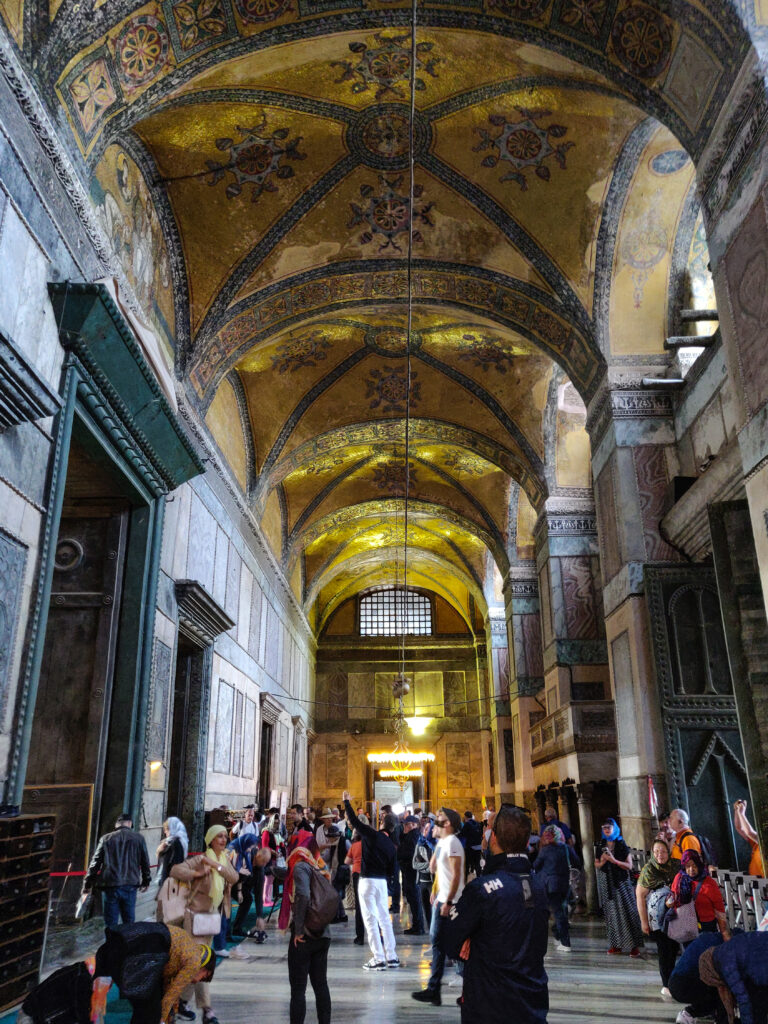
First, you arrive at the outer narthex, and then into this inner narthex, where, as in mosques, you remove your shoes and place them in the shoe lockers visible on the left side of the photo.
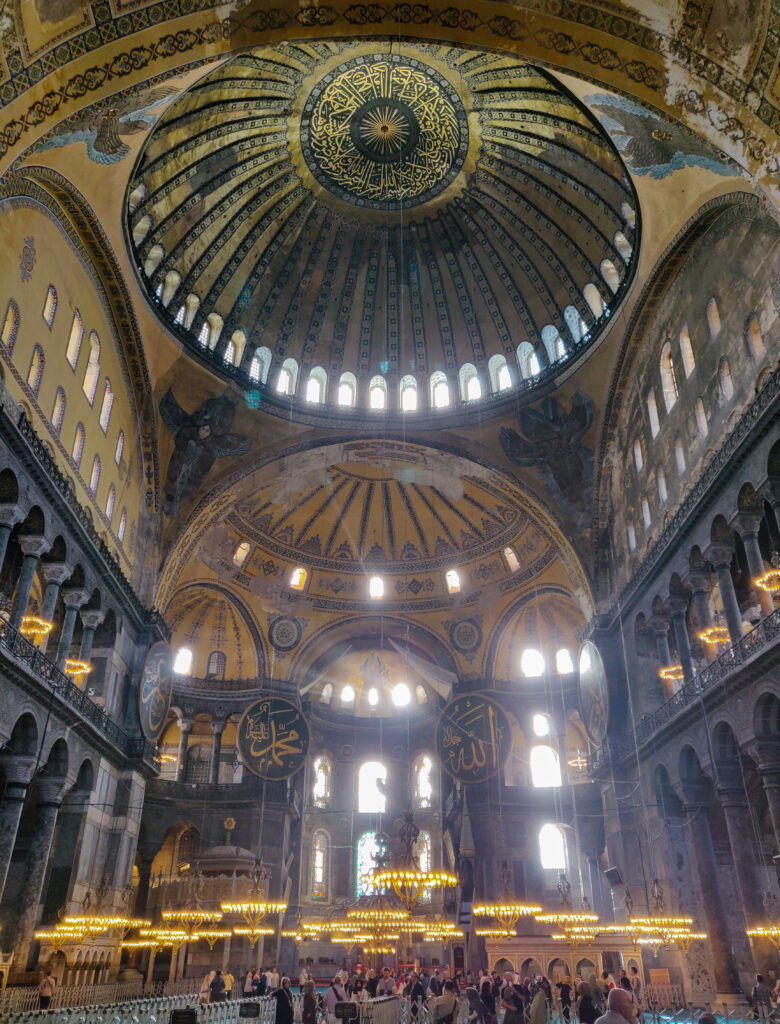
As you step into one of the most famous buildings in the world, you breathe in human history, and the power, beauty, and sanctity of this place take over your heart.
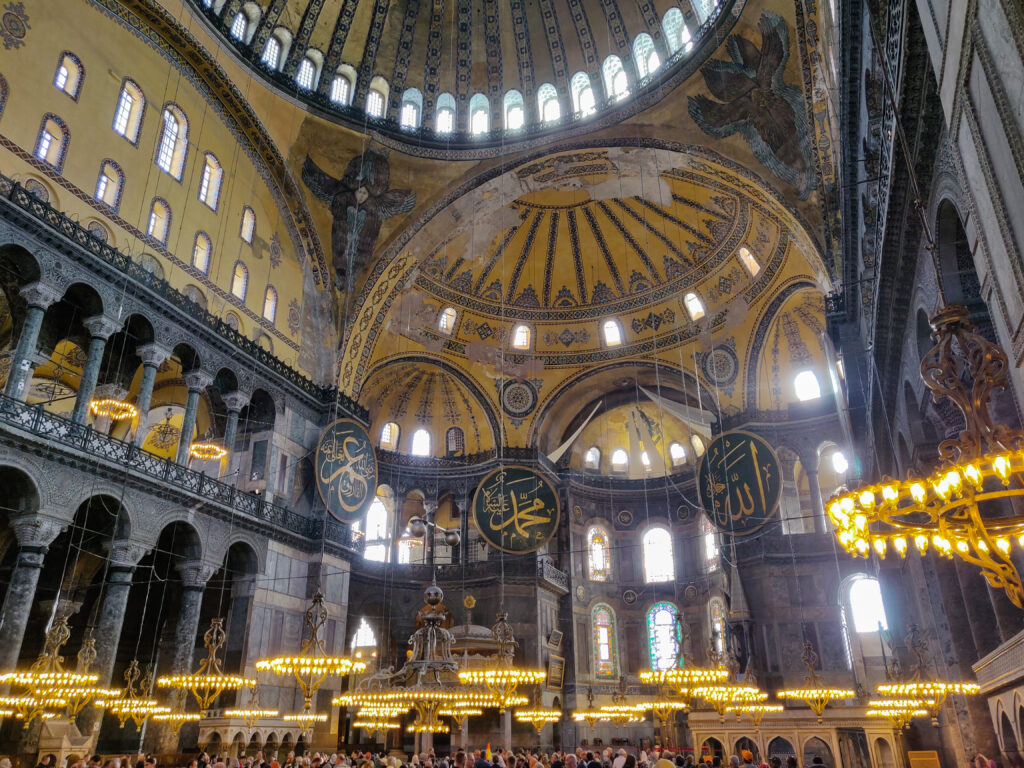
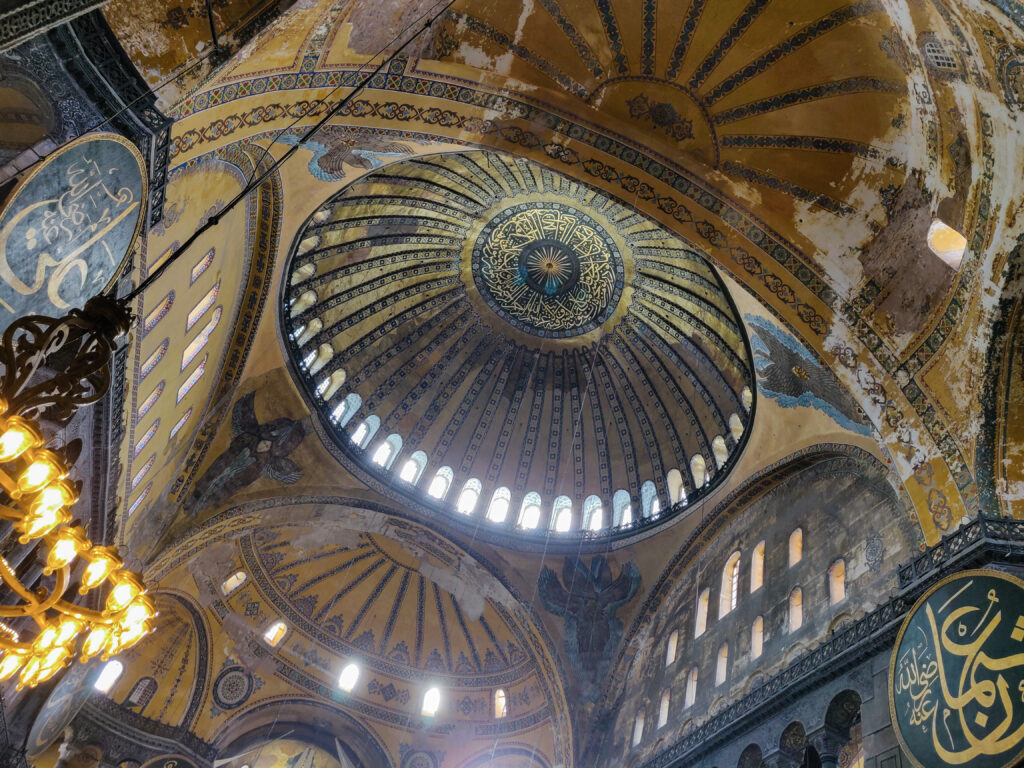
The main dome of Hagia Sophia’s roof is 55.6 meters high and about 32 meters in diameter. The final shape of the dome was designed by architect Mimar Sinan. The 40 windows at the base of the main dome create the impression that the dome is floating in the air. Additionally, the main dome is flanked by two semi-domes.
In Turkish-Islamic architecture, the dome represents heaven and the unity of Allah. For this reason, verses from the Quran about monotheism, heaven, the sun, stars, and light are inscribed on the dome.
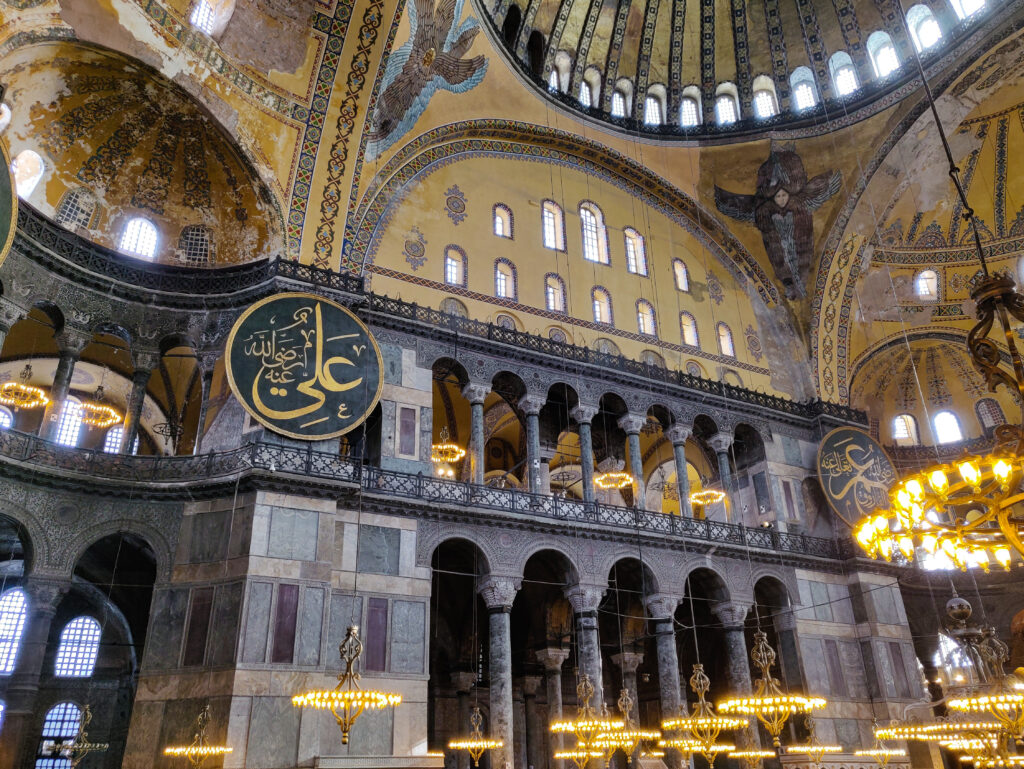
We begin our tour of Hagia Sophia clockwise from the outer door, following the left side.
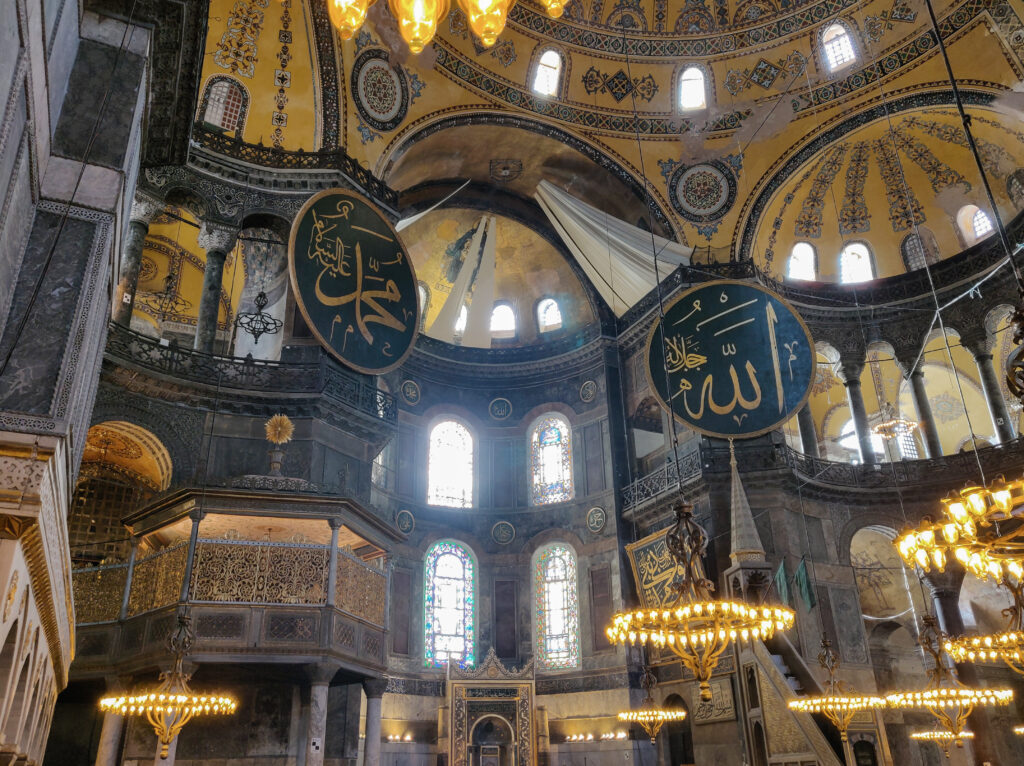
We walk towards the front, which we would call the altar if we were in a Christian church – which Hagia Sophia has been in its history.
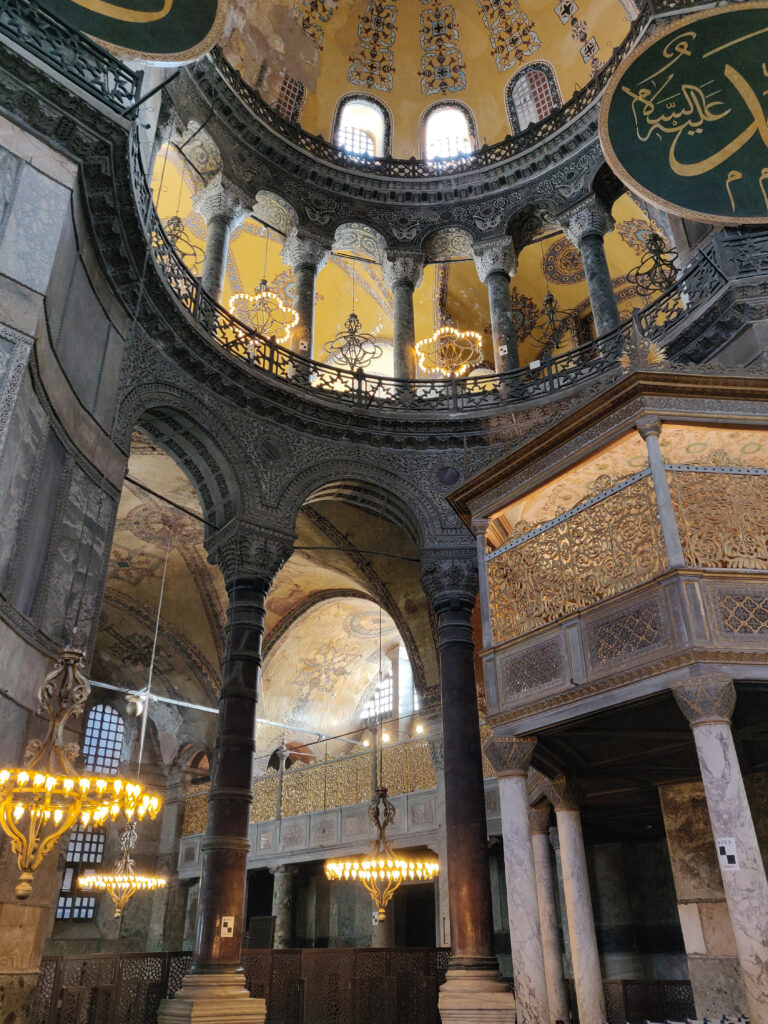
On the left, there is a beautiful view, showing that Hagia Sophia is truly a wide building also in the lateral direction.
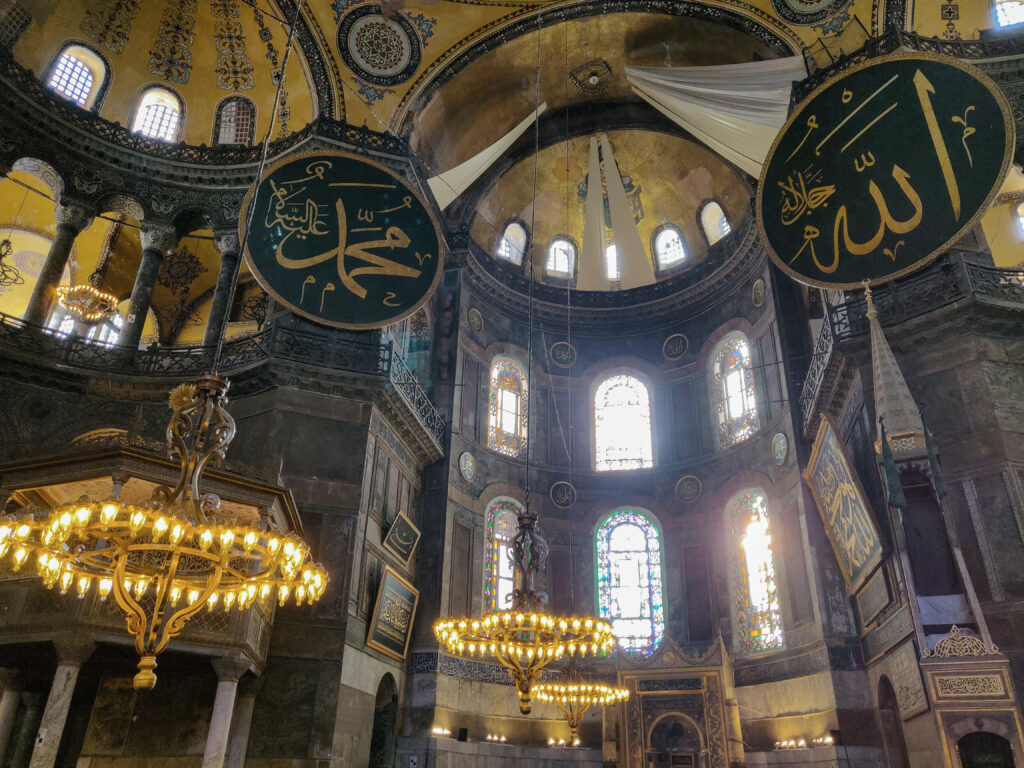
We arrive at the stunningly beautiful front.
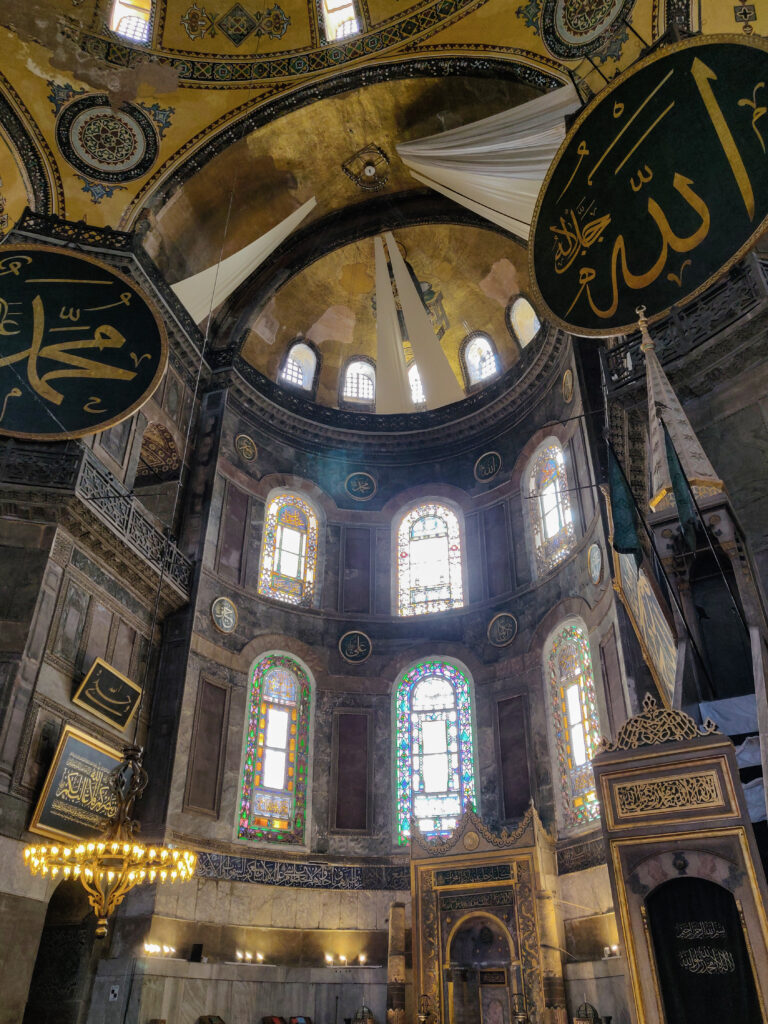
At the front, we find colourful stained-glass windows. I apologize that I was unable to get better photos of these fine artworks in the sunlight, i.e., against the light.
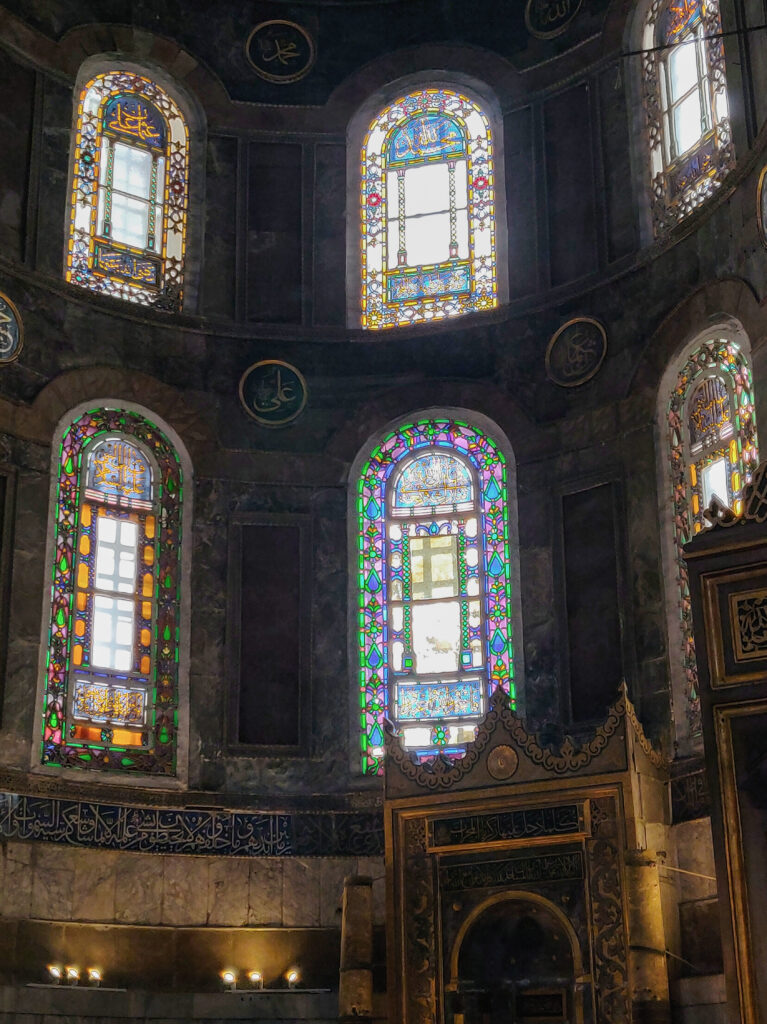
As we turn around, our view is now towards the back of Hagia Sophia. On the back wall, we also see the outer door through which we entered.
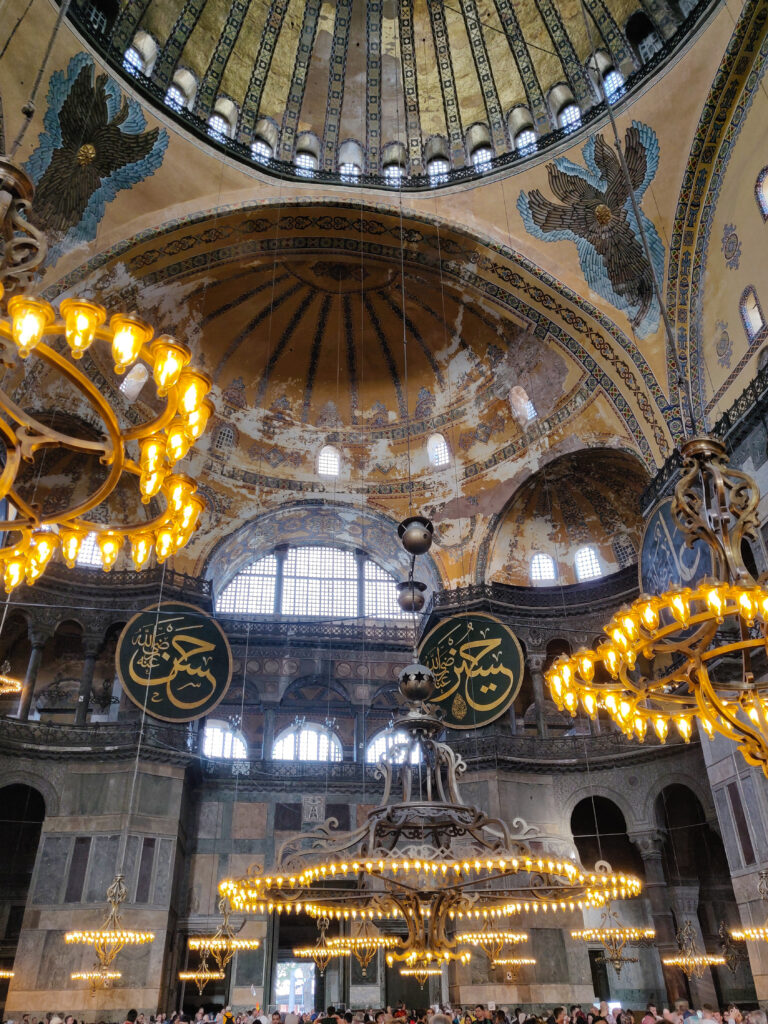
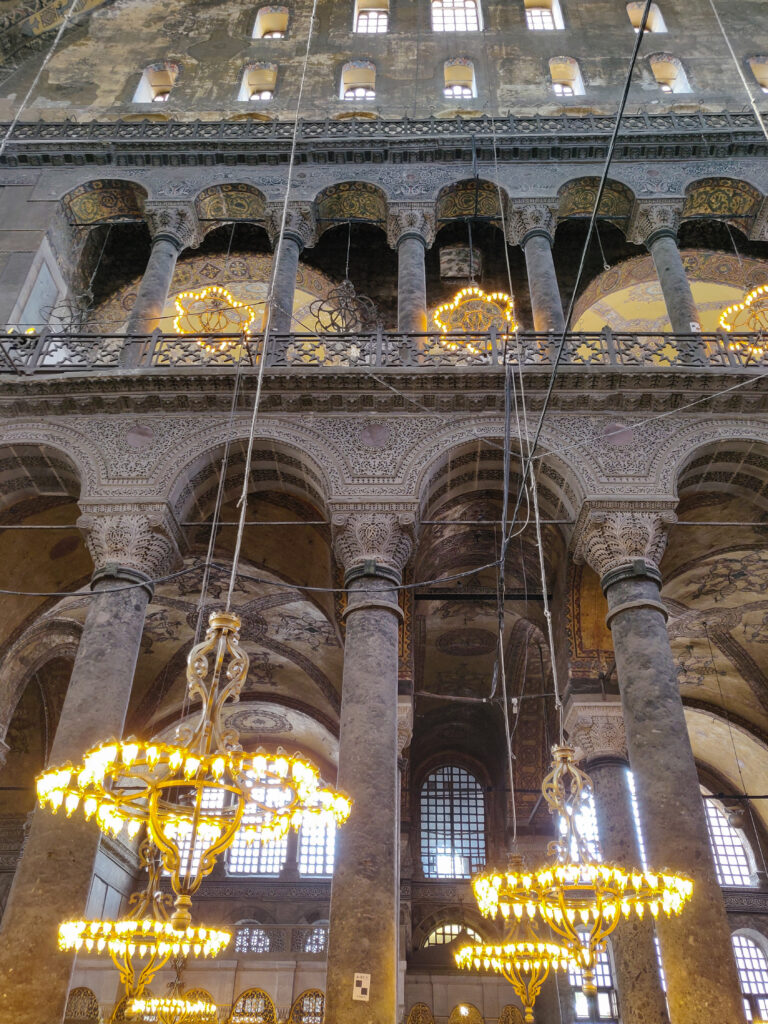
We continue our walk clockwise, now exploring the left side from the front. We notice the building expanding in this direction as well.
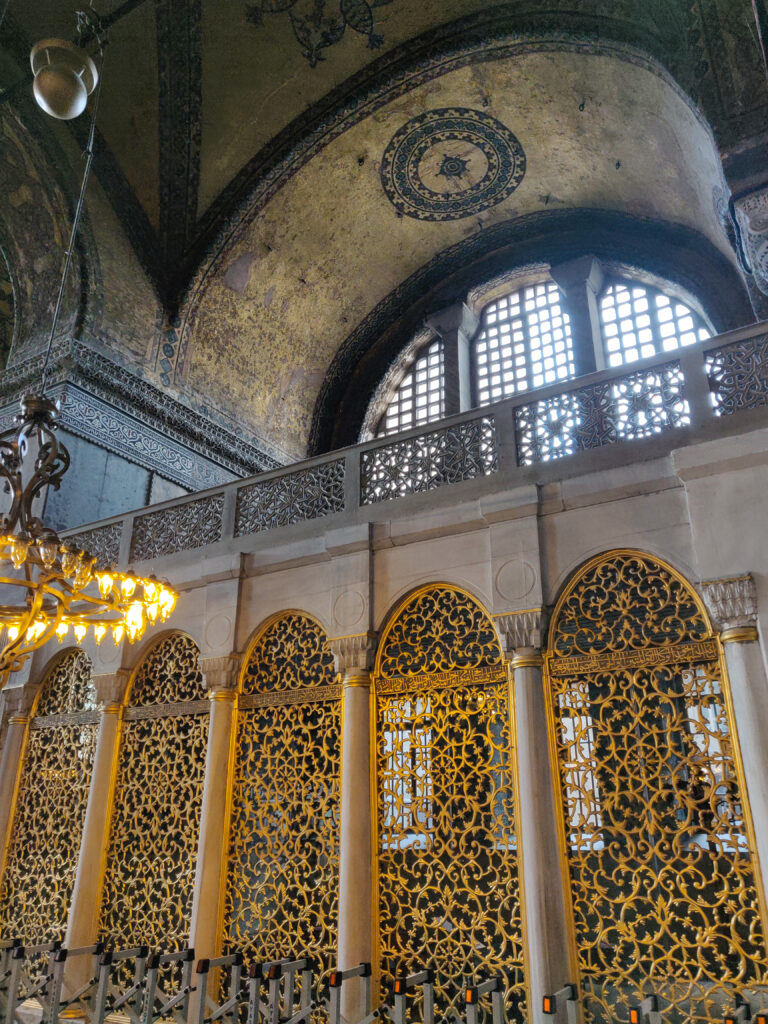
After stepping into this area on the left side, we find a beautiful view where we can admire the delicate golden “lace decoration”.
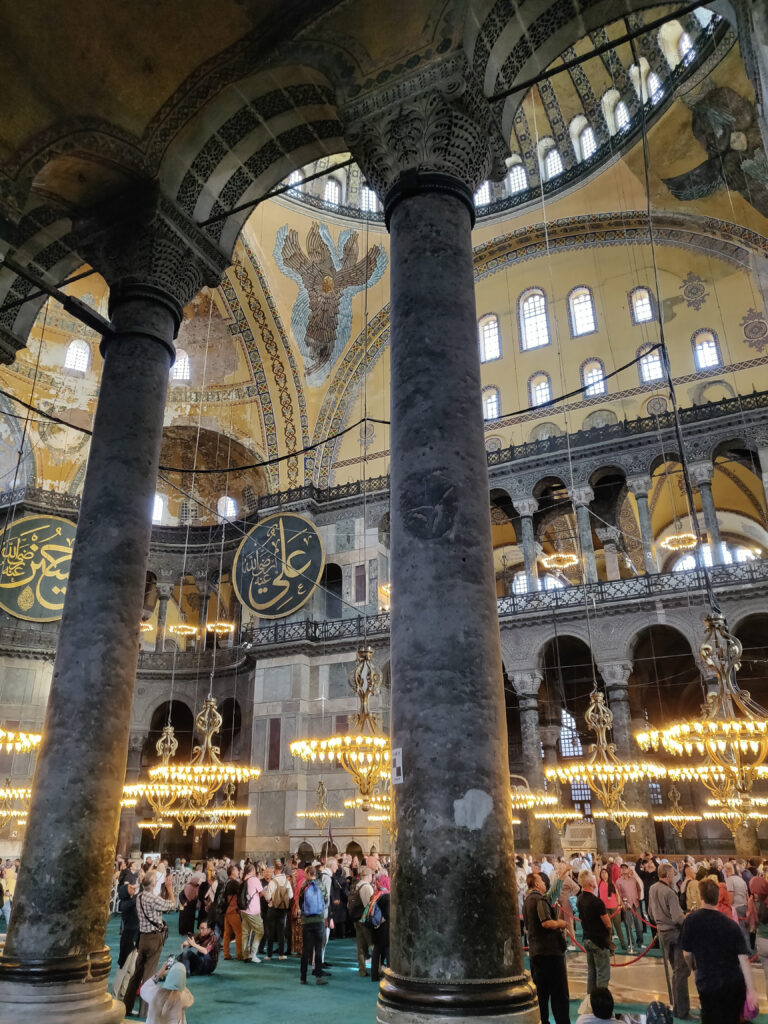
View of the large prayer hall of the mosque from behind the row of columns on the side.
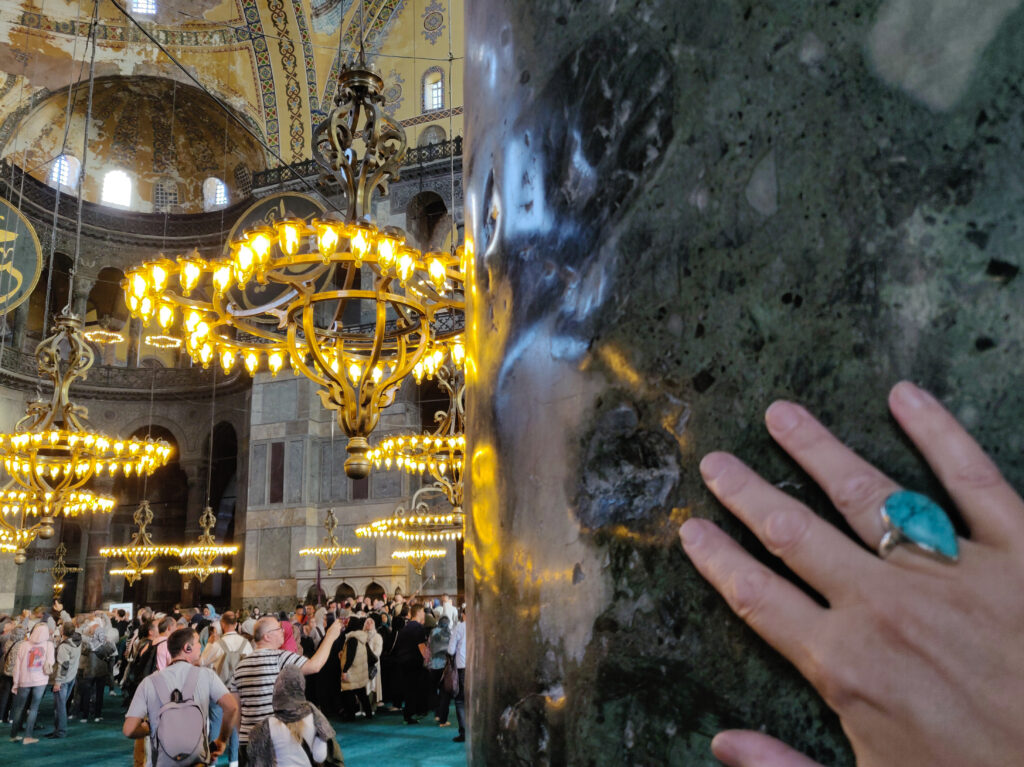
The whisper of history. We see that a few other hands besides just this blogger’s hand have touched this column over time.
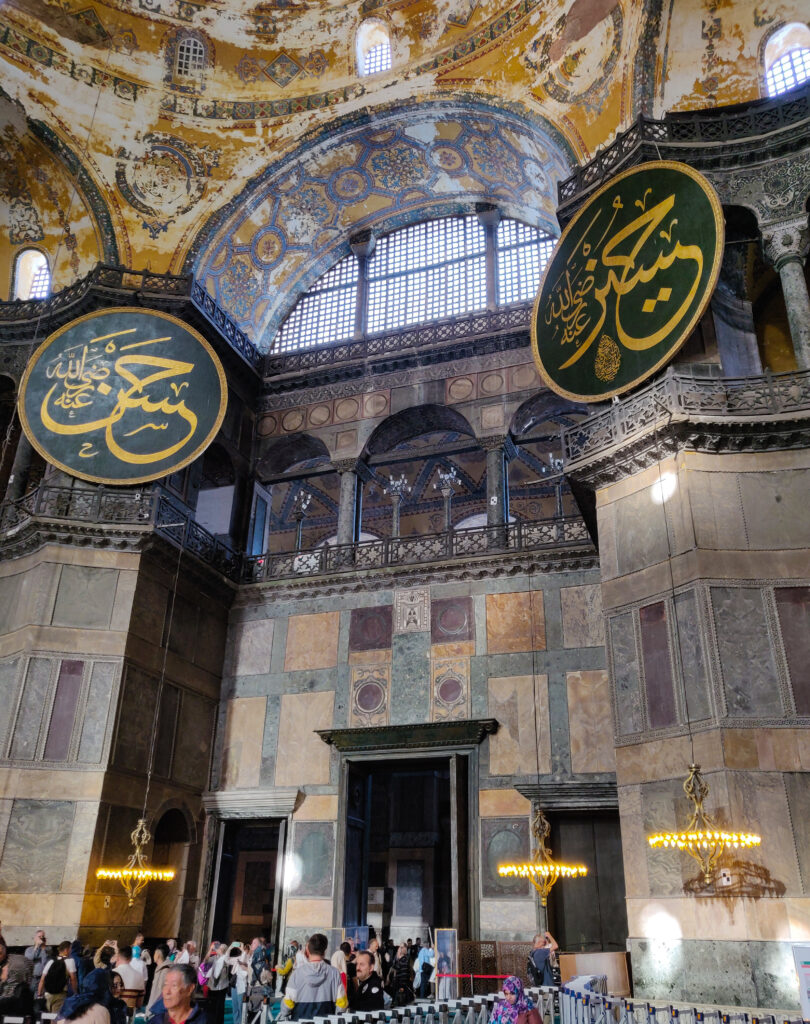
Our tour inside Hagia Sophia is coming to an end, and we exit through the same large back wall door through which we had entered.
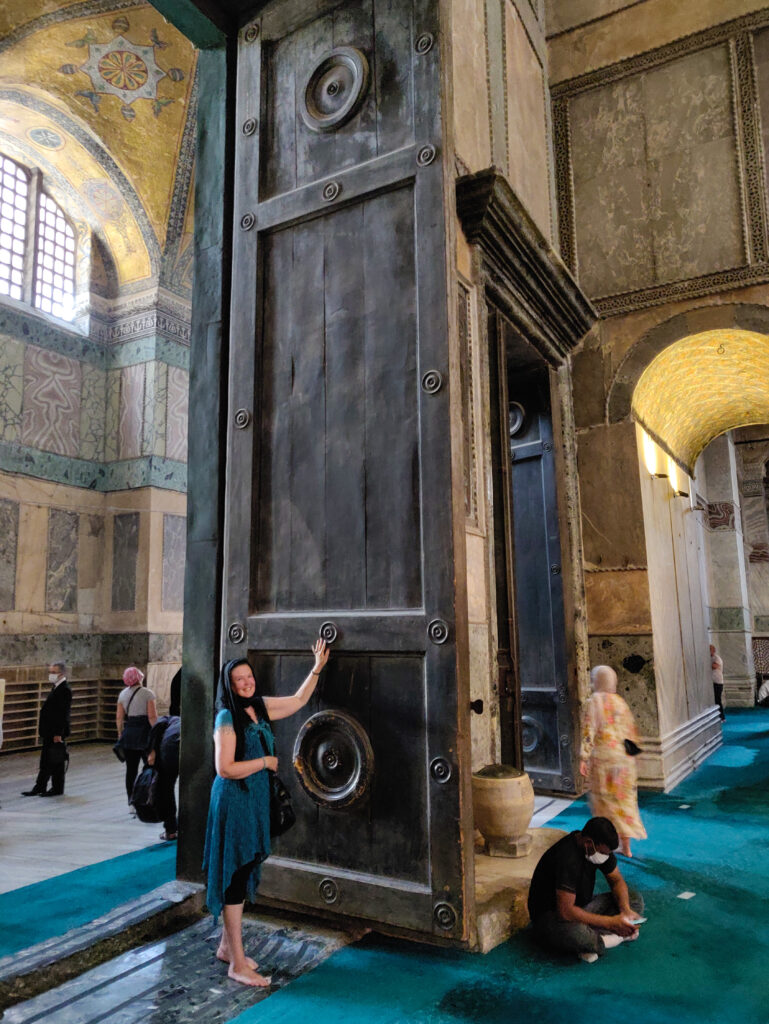
Even a tall blogger feels both short and small in the presence of world history. This 7-meter-tall impressive wooden door is the largest door of Hagia Sophia. According to historical sources, only the emperor and his entourage used this “imperial gate” when entering Hagia Sophia. According to ancient Byzantine sources, the wood of the door comes from Noah’s Ark. This information remains a legend due to a lack of evidence, but it is nevertheless a fascinating mystery.
When I look at the photo of my own attire, it’s necessary to remind you of the dress code. Since Hagia Sophia is now a mosque, all visitors are required to follow the general etiquette for visiting mosques. For example, women must cover their heads and bodies when entering the mosque.
This photo was taken in 2020, and with this attire, I would be turned away at the door today, even though my shoulders and head are technically covered. The dress code is now stricter and it is non-negotiable – familiarize yourself with the visit etiquette in advance! As a woman, be prepared to cover yourself. Note that if you are traveling with your family, this also applies to teenage daughters.
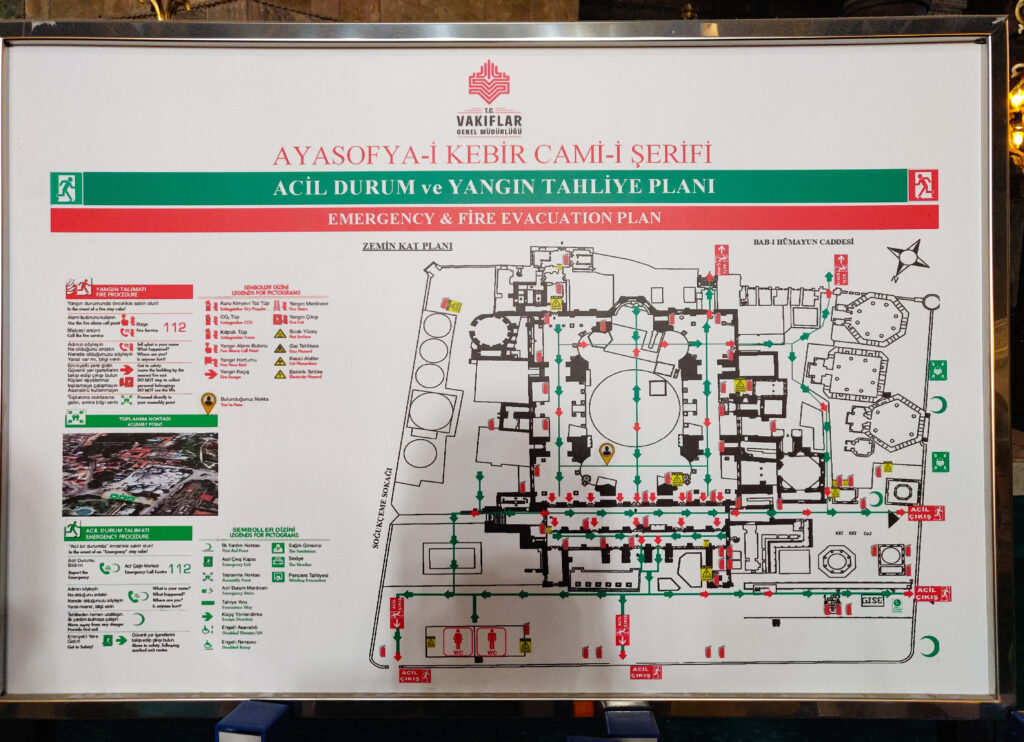
When you look at this evacuation plan of Hagia Sophia, you’ll notice that even though we are now leaving the main prayer hall of the mosque, we have only explored a small part of the entire Hagia Sophia area and block.
In this post, it’s possible to convey only a brief part of this magnificent and diverse complex, so you can find more information about Hagia Sophia here
Tour outside around the block
We now continue our journey outside, circling the entire block. In my opinion, Hagia Sophia is also interesting from the outside, and sometimes it even seems that it is architecturally chameleon-like, especially from the exterior.
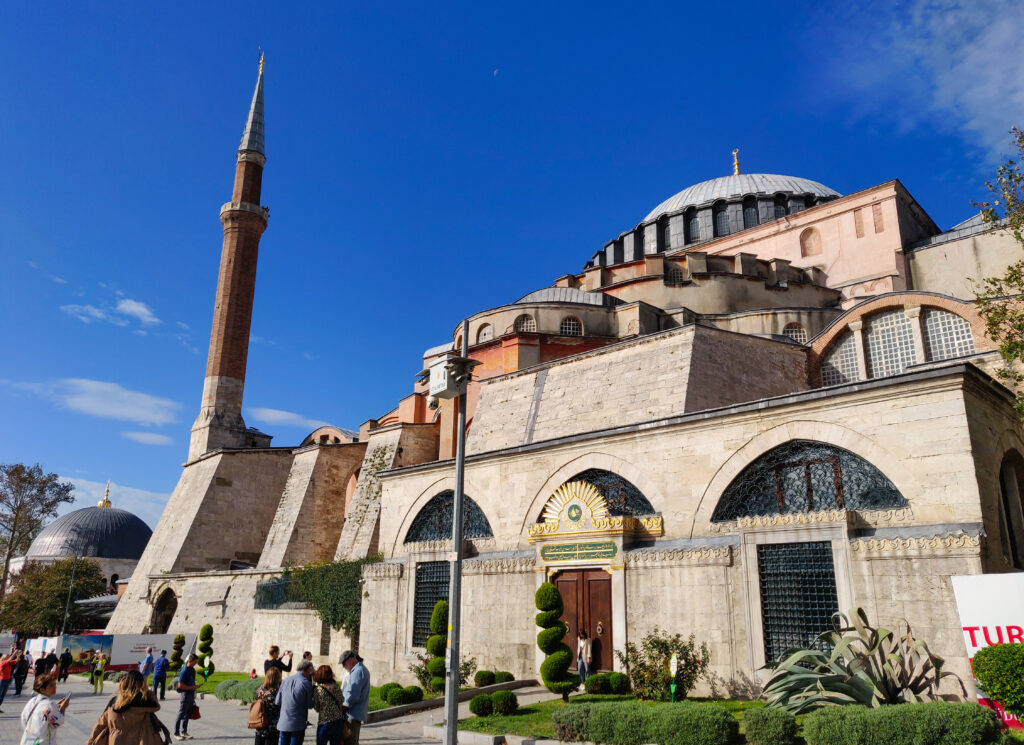
This photo was taken from Gabasakal Street (Gabasakal Caddesi), where you can also find the entrance to Topkapı Palace (Topkapı Sarayı).
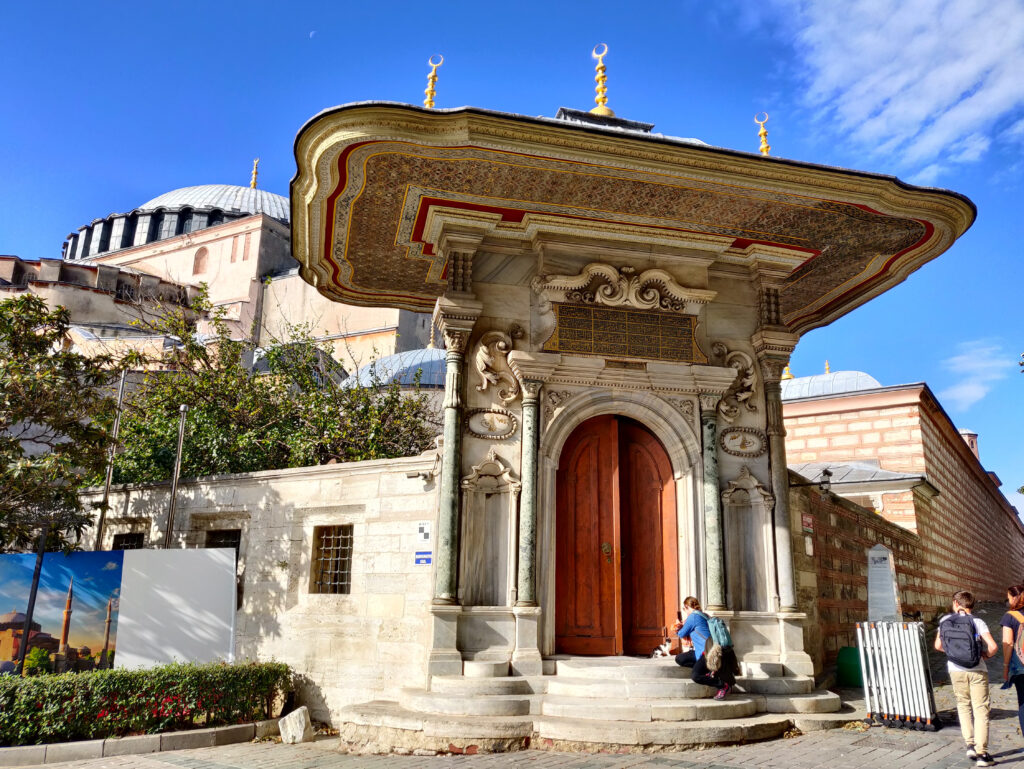
Here, on the other hand, is a beautiful and interesting corner of the Hagia Sophia block on Soğuk Çeşme Street (Soğuk Çeşme Sokağı).
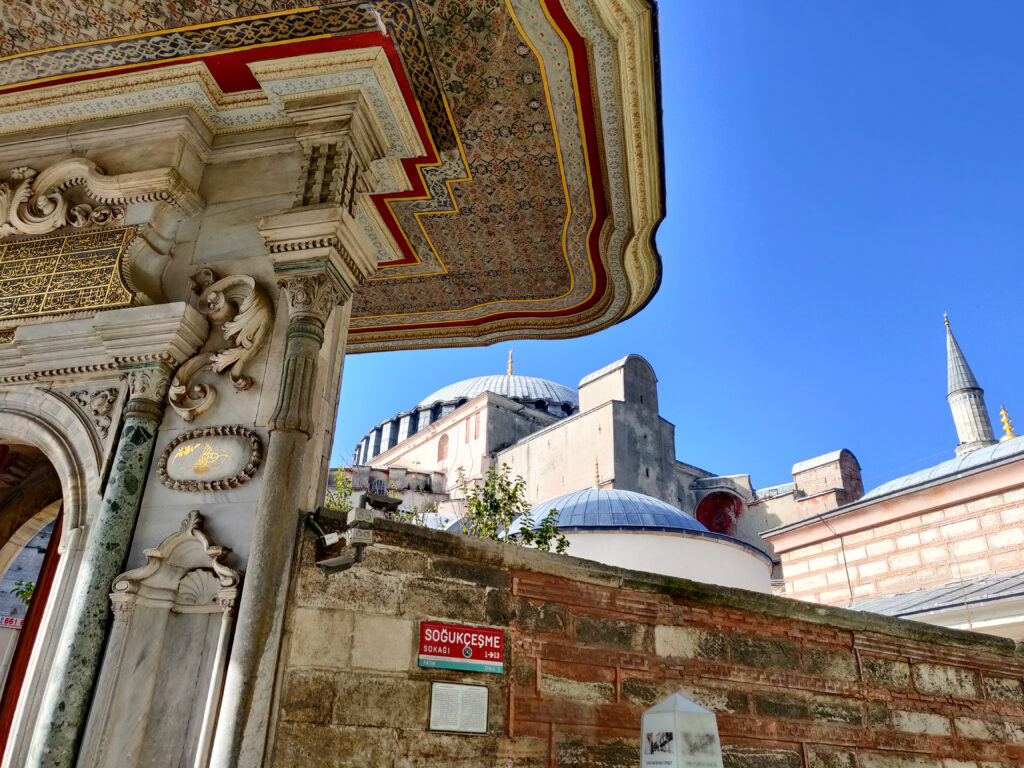
Farewells
After the whole tour, I usually like to return to the square to bid a fond farewell to Hagia Sophia. So, we will do the same now.
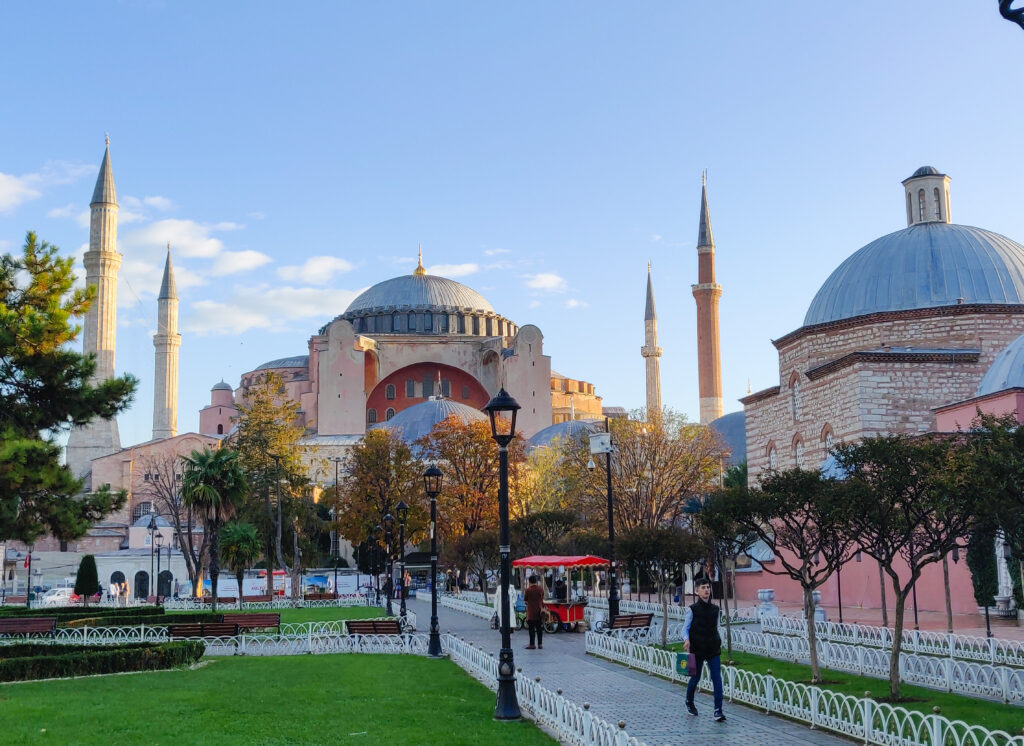
The beautiful building on the right side of the photo is the Hürrem Sultan Bathhouse, or hamam (Hürrem Sultan Hamamı), which is still in operation. It is said to be one of the most beautiful baths in Istanbul. In front of the hamam, there is a nice café and an ice cream kiosk.
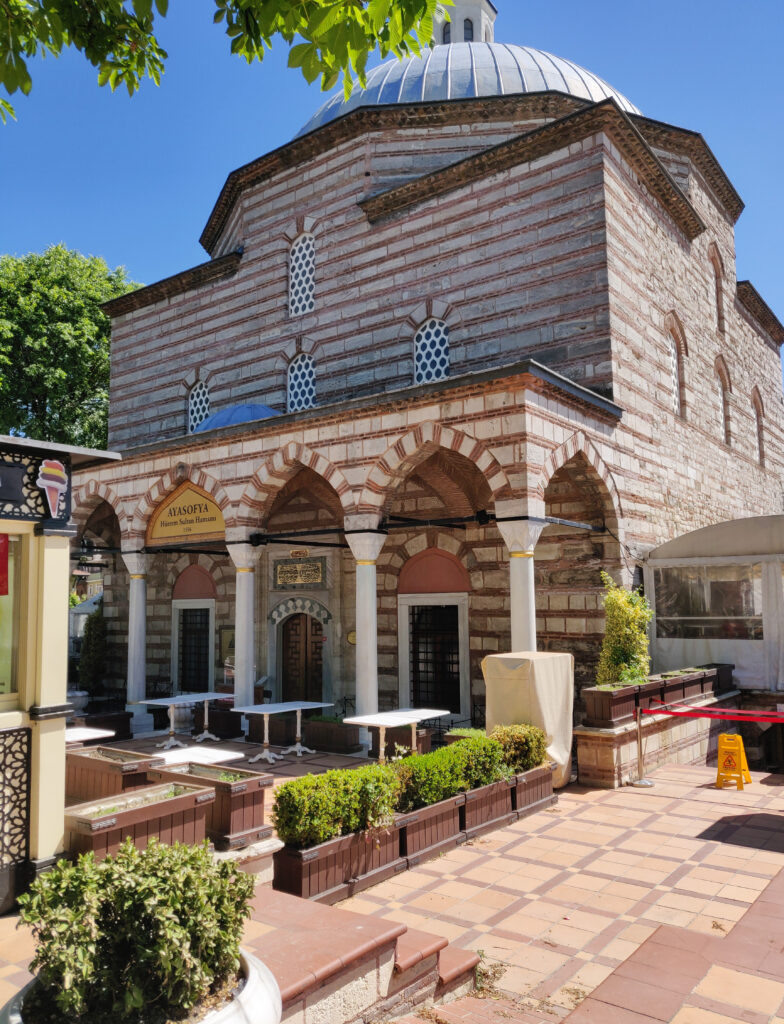
Now it’s time to say the final farewell to this historical treasure. In the video below, you can reminisce about Hagia Sophia from the inside and see the entire large prayer hall at once.
Hagia Sophia, you remain in our hearts.
